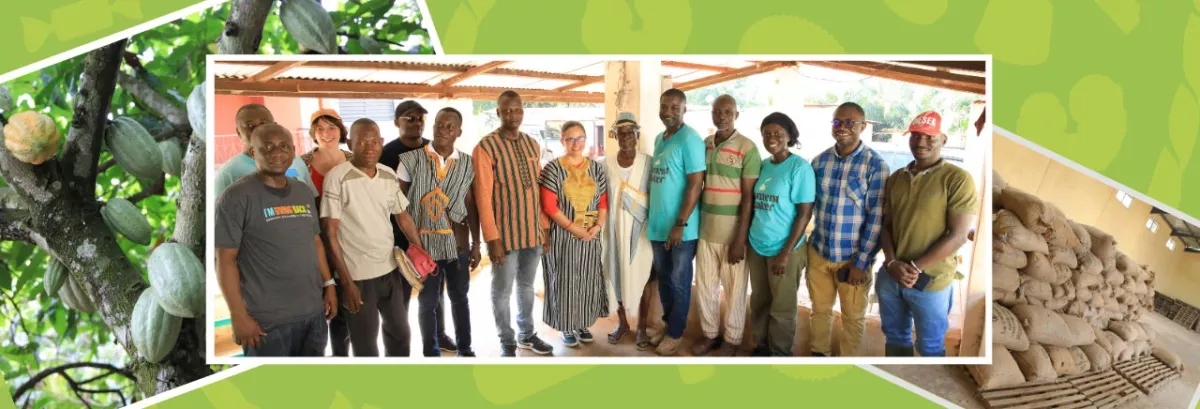How Hershey Is Working To Raise Cocoa Farmers’ Income
Since our founding 130 years ago, Hershey has supplied chocolate lovers with moments of goodness from our iconic treats.

By Angela Tejada Chavez
Key Takeaways:
- At Hershey, we want our cocoa to come from communities where farmers and their children have a bright future.
- A host of challenges continue to face cocoa farming communities, and it is putting current and future generations of cocoa farmers at risk – that’s why we’re working to improve farmer income and resilience.
- To support cocoa-farming households, we launched the Hershey Income Accelerator Program (HIAP) and have made the first round of payments to participating farmers.
Since our founding 130 years ago, Hershey has supplied chocolate lovers with moments of goodness from our iconic treats. Even as our portfolio has expanded to include a variety of sweet and salty snacks, cocoa remains a key ingredient of many of the Hershey products people know and love.
But when it comes to the farmers who grow the majority of the world’s cocoa, the challenges they face make earning their living bittersweet. Too many cocoa farmers live in poverty. This means they struggle not only with earning a living income, but with associated challenges like poor health, lack of standard on-farm practices, and environmental risks like pests and disease are also common.
At Hershey, we want our cocoa to come from communities where farmers and their children have a bright future. That is why we’re working to help cocoa-farming communities and improve the quality of life for farmers and their families. Since we launched the Hershey Income Accelerator Program (HIAP) last year, we have laid the groundwork for a new approach to working with the farmers that grow our most important ingredient.
HIAP, an investment of $40 million over five years in addition to the $500 million already committed to our Cocoa For Good strategy, was developed in consultation with Côte d’Ivoire’s national governing body for cocoa, the Conseil du Café-Cacao, and with Hershey’s three programmatic partners: CARE International, Rainforest Alliance (RA), and PUR. Through the Income Accelerator, we aim to improve the income of cocoa farming households by 20% through cash transfers made on top of the price set by local governments.
In the first year of implementation, Hershey reached 1,850 farmers and this spring, more than 1,400 received the first cash transfers directly to their mobile money accounts. We are scaling up the program and aim to support at least 20,000 households.
Siméon Oulaï, cocoa producer in Duékoué, shared with us, “The first payment received in March was a very pleasant surprise, and I quickly reinvested the money in my plantation. But this program goes beyond the financial aspect - the training gives us the ability to boost our production while preserving our environment.”
Closing the farmer income gap has far-ranging benefits which can resonate throughout cocoa communities and benefit the global supply chain. It enables the farmer to better balance the costs of operating a cocoa farm. When families have sufficient income, they’re more likely to send their children to school to get a quality education. Financial resources help farmers to adopt environmentally responsible agricultural practices such as recultivating existing farms rather than moving on to new ones. Farmers may be more likely to invest in shade-grown cocoa crops, which support biodiversity and improve yields.
Thierry Kouassi, group administrator at the HIAP cooperative in Duékoué, says that HIAP will have a ripple effect for farmers. “The enthusiasm is palpable. Even producers who were initially reluctant are now knocking on our door. The extension of the project to more producers from 2025 is excellent news for our entire community.”
A resilient supply chain is critical to our business and those that work within it. That’s why we are making long-term investments in building relationships with committed cooperatives. Cooperatives play a key role in providing services to farmers, and long-term relationships are fundamental to improving resilience.
We’re just getting started. Our first HIAP payments will be followed by two additional cash transfers this year. Payments to farming families at the beginning of the school year is intended to empower them to seek education for their children and another toward the end of the year aims to help farmers implement sustainable farming practices – the center of the program – that will lead to a more productive, resilient crop and lasting improvements.
At Hershey, we are steadfast in our commitment to making sure cocoa farmers and their families can prosper, both now and in the future. As we scale these initiatives in the years ahead, we will continue to report transparently on our progress and share what we’ve learned.
